Case Study: Enhancing Talent Management with Data-Driven Decisions
VerifiedAdded on 2024/01/03
|6
|4776
|360
Case Study
AI Summary
This case study examines how leveraging big data can revolutionize talent management decisions and improve organizational performance. It presents three examples: a professional services firm (ServiceCo) struggling with a new line of business due to a poorly constructed team, a Fortune 500 corporation (Initech) facing declining profits due to increased competition, and SGB dealing with C-suite alignment. ServiceCo initially attributed poor performance to insufficient training but discovered that the team comprised individuals with conflicting work styles. Initech failed to adapt its sales strategy to changing market dynamics, while SGB struggled with strategic alignment among its C-suite members. In each case, the implementation of data-driven talent appraisal systems (TAS) and psychometric assessments enabled the companies to identify the root causes of their challenges and make informed decisions about team composition, sales strategies, and leadership alignment, ultimately leading to improved organizational performance and revenue generation. The study highlights the importance of understanding individual characteristics and team dynamics through data analysis to optimize talent management practices.
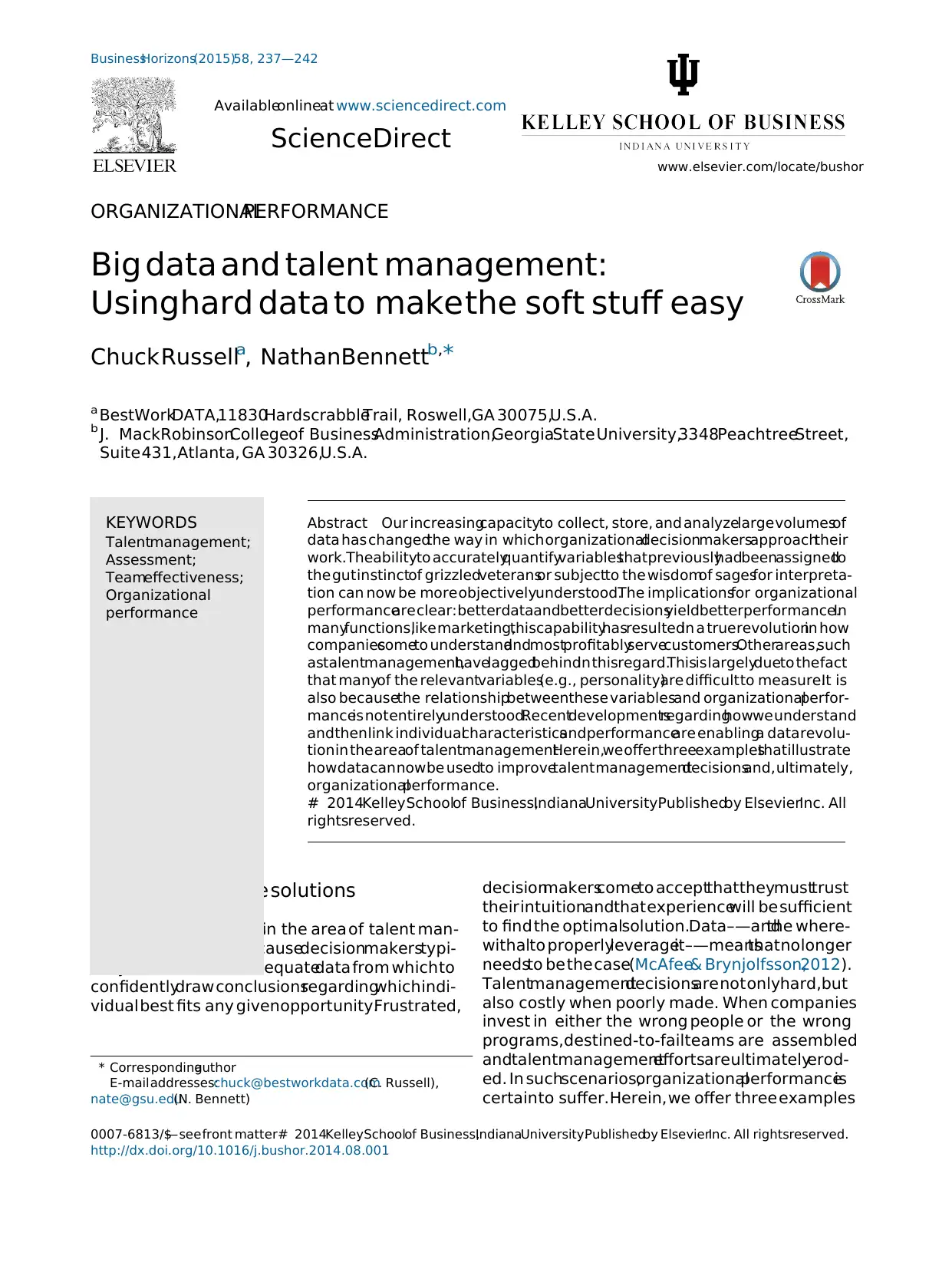
ORGANIZATIONALPERFORMANCE
Big data and talent management:
Usinghard data to make the soft stuff easy
Chuck Russella, NathanBennettb,*
a BestWorkDATA,11830HardscrabbleTrail, Roswell,GA 30075,U.S.A.
b J. MackRobinsonCollegeof BusinessAdministration,GeorgiaState University,3348PeachtreeStreet,
Suite 431,Atlanta, GA 30326,U.S.A.
1. From data come solutions
Makingsounddecisionsin the area of talent man-
agementis difficult becausedecisionmakerstypi-
cally havelittle or inadequatedata from which to
confidentlydraw conclusionsregardingwhich indi-
vidual best fits any given opportunity.Frustrated,
decisionmakerscometo acceptthattheymusttrust
their intuitionandthat experiencewill be sufficient
to find the optimalsolution.Data–—andthe where-
withalto properlyleverageit–—meansthatno longer
needsto be the case(McAfee& Brynjolfsson,2012).
Talentmanagementdecisionsare not onlyhard,but
also costly when poorly made. When companies
invest in either the wrong people or the wrong
programs,destined-to-failteams are assembled
andtalentmanagementeffortsare ultimatelyerod-
ed. In suchscenarios,organizationalperformanceis
certain to suffer. Herein, we offer three examples
BusinessHorizons(2015)58, 237—242
Availableonlineat www.sciencedirect.com
ScienceDirect www.elsevier.com/locate/bushor
KEYWORDS
Talentmanagement;
Assessment;
Teameffectiveness;
Organizational
performance
Abstract Our increasingcapacityto collect, store, and analyzelarge volumesof
data has changedthe way in which organizationaldecisionmakersapproachtheir
work.Theabilityto accuratelyquantifyvariablesthatpreviouslyhadbeenassignedto
the gut instinctof grizzledveteransor subjectto the wisdomof sagesfor interpreta-
tion can now be more objectivelyunderstood.The implicationsfor organizational
performanceare clear: betterdataandbetterdecisionsyieldbetterperformance.In
manyfunctions,like marketing,thiscapabilityhasresultedin a truerevolutionin how
companiescometo understandandmostprofitablyservecustomers.Otherareas,such
astalentmanagement,havelaggedbehindin thisregard.Thisis largelydueto thefact
that manyof the relevantvariables(e.g., personality)are difficult to measure.It is
also becausethe relationshipbetweenthese variablesand organizationalperfor-
manceis not entirelyunderstood.Recentdevelopmentsregardinghowwe understand
andthen link individualcharacteristicsandperformanceare enablinga data revolu-
tion in the areaof talentmanagement.Herein,we offer threeexamplesthatillustrate
howdatacan nowbe usedto improvetalent managementdecisionsand, ultimately,
organizationalperformance.
# 2014Kelley Schoolof Business,IndianaUniversity.Publishedby ElsevierInc. All
rightsreserved.
* Correspondingauthor
E-mail addresses:chuck@bestworkdata.com(C. Russell),
nate@gsu.edu(N. Bennett)
0007-6813/$— see front matter# 2014KelleySchoolof Business,IndianaUniversity.Publishedby ElsevierInc. All rightsreserved.
http://dx.doi.org/10.1016/j.bushor.2014.08.001
Big data and talent management:
Usinghard data to make the soft stuff easy
Chuck Russella, NathanBennettb,*
a BestWorkDATA,11830HardscrabbleTrail, Roswell,GA 30075,U.S.A.
b J. MackRobinsonCollegeof BusinessAdministration,GeorgiaState University,3348PeachtreeStreet,
Suite 431,Atlanta, GA 30326,U.S.A.
1. From data come solutions
Makingsounddecisionsin the area of talent man-
agementis difficult becausedecisionmakerstypi-
cally havelittle or inadequatedata from which to
confidentlydraw conclusionsregardingwhich indi-
vidual best fits any given opportunity.Frustrated,
decisionmakerscometo acceptthattheymusttrust
their intuitionandthat experiencewill be sufficient
to find the optimalsolution.Data–—andthe where-
withalto properlyleverageit–—meansthatno longer
needsto be the case(McAfee& Brynjolfsson,2012).
Talentmanagementdecisionsare not onlyhard,but
also costly when poorly made. When companies
invest in either the wrong people or the wrong
programs,destined-to-failteams are assembled
andtalentmanagementeffortsare ultimatelyerod-
ed. In suchscenarios,organizationalperformanceis
certain to suffer. Herein, we offer three examples
BusinessHorizons(2015)58, 237—242
Availableonlineat www.sciencedirect.com
ScienceDirect www.elsevier.com/locate/bushor
KEYWORDS
Talentmanagement;
Assessment;
Teameffectiveness;
Organizational
performance
Abstract Our increasingcapacityto collect, store, and analyzelarge volumesof
data has changedthe way in which organizationaldecisionmakersapproachtheir
work.Theabilityto accuratelyquantifyvariablesthatpreviouslyhadbeenassignedto
the gut instinctof grizzledveteransor subjectto the wisdomof sagesfor interpreta-
tion can now be more objectivelyunderstood.The implicationsfor organizational
performanceare clear: betterdataandbetterdecisionsyieldbetterperformance.In
manyfunctions,like marketing,thiscapabilityhasresultedin a truerevolutionin how
companiescometo understandandmostprofitablyservecustomers.Otherareas,such
astalentmanagement,havelaggedbehindin thisregard.Thisis largelydueto thefact
that manyof the relevantvariables(e.g., personality)are difficult to measure.It is
also becausethe relationshipbetweenthese variablesand organizationalperfor-
manceis not entirelyunderstood.Recentdevelopmentsregardinghowwe understand
andthen link individualcharacteristicsandperformanceare enablinga data revolu-
tion in the areaof talentmanagement.Herein,we offer threeexamplesthatillustrate
howdatacan nowbe usedto improvetalent managementdecisionsand, ultimately,
organizationalperformance.
# 2014Kelley Schoolof Business,IndianaUniversity.Publishedby ElsevierInc. All
rightsreserved.
* Correspondingauthor
E-mail addresses:chuck@bestworkdata.com(C. Russell),
nate@gsu.edu(N. Bennett)
0007-6813/$— see front matter# 2014KelleySchoolof Business,IndianaUniversity.Publishedby ElsevierInc. All rightsreserved.
http://dx.doi.org/10.1016/j.bushor.2014.08.001
Paraphrase This Document
Need a fresh take? Get an instant paraphrase of this document with our AI Paraphraser
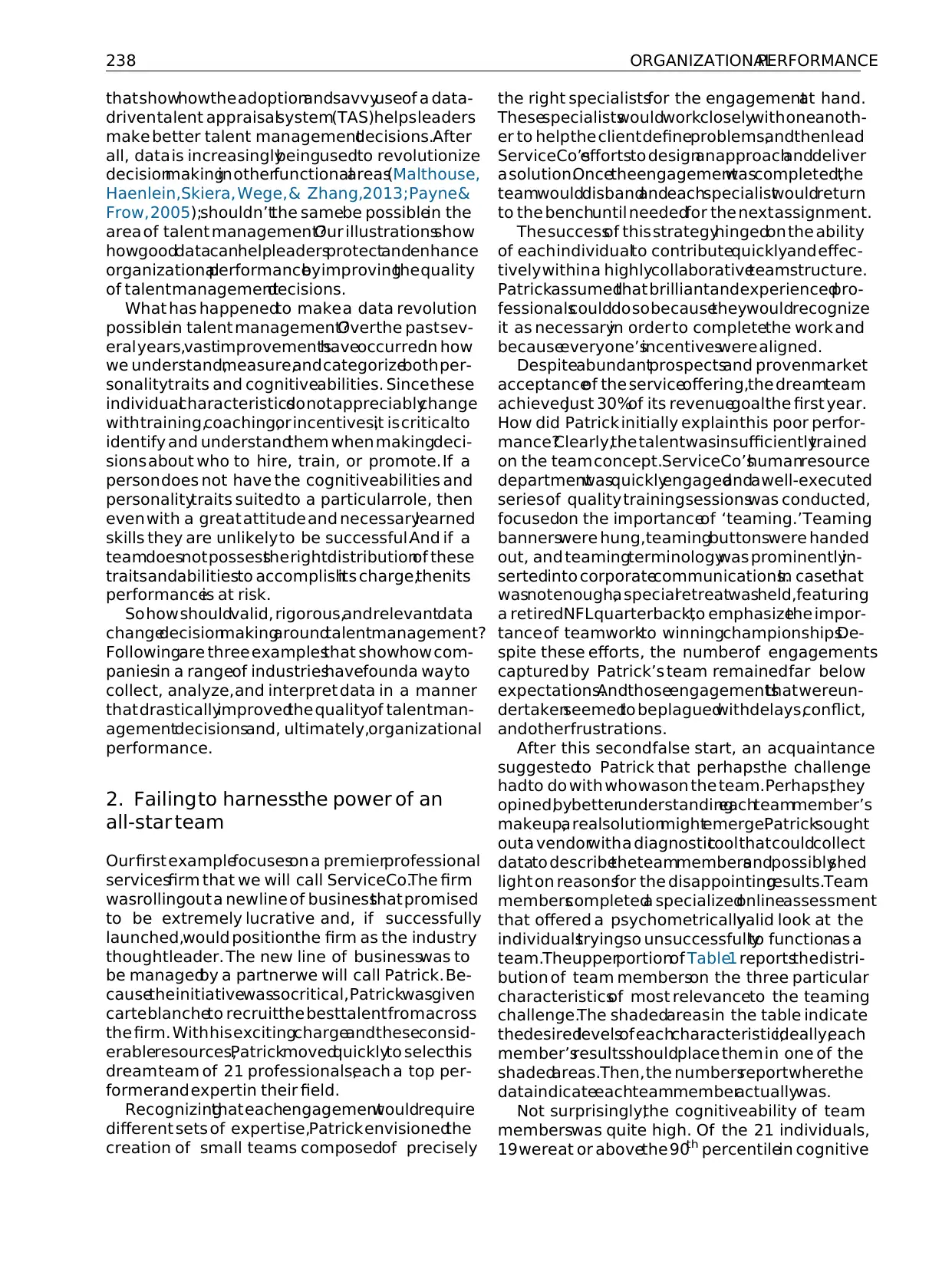
that showhowthe adoptionandsavvyuseof a data-
driven talent appraisalsystem(TAS)helps leaders
make better talent managementdecisions.After
all, data is increasinglybeingusedto revolutionize
decisionmakingin otherfunctionalareas(Malthouse,
Haenlein,Skiera, Wege, & Zhang,2013; Payne&
Frow, 2005);shouldn’tthe samebe possiblein the
area of talent management?Our illustrationsshow
howgooddatacanhelpleadersprotectandenhance
organizationalperformancebyimprovingthe quality
of talent managementdecisions.
What has happenedto make a data revolution
possiblein talent management?Overthe past sev-
eral years,vastimprovementshaveoccurredin how
we understand,measure,and categorizeboth per-
sonalitytraits and cognitiveabilities. Since these
individualcharacteristicsdo not appreciablychange
with training,coaching,or incentives,it is criticalto
identify and understandthem when makingdeci-
sions about who to hire, train, or promote. If a
person does not have the cognitiveabilities and
personalitytraits suited to a particularrole, then
even with a great attitude and necessarylearned
skills they are unlikely to be successful.And if a
teamdoesnot possessthe rightdistributionof these
traitsandabilitiesto accomplishits charge,thenits
performanceis at risk.
So how shouldvalid, rigorous,and relevantdata
changedecisionmakingaroundtalentmanagement?
Followingare three examplesthat showhow com-
paniesin a rangeof industrieshavefounda way to
collect, analyze, and interpret data in a manner
that drasticallyimprovedthe qualityof talentman-
agementdecisionsand, ultimately,organizational
performance.
2. Failing to harnessthe power of an
all-star team
Our first examplefocuseson a premierprofessional
servicesfirm that we will call ServiceCo.The firm
wasrollingout a new line of businessthat promised
to be extremely lucrative and, if successfully
launched,would positionthe firm as the industry
thoughtleader. The new line of businesswas to
be managedby a partnerwe will call Patrick. Be-
causethe initiativewassocritical, Patrickwasgiven
carte blancheto recruitthe besttalent fromacross
the firm. With his excitingchargeandtheseconsid-
erableresources,Patrickmovedquicklyto selecthis
dream team of 21 professionals,each a top per-
formerand expertin their field.
Recognizingthat eachengagementwouldrequire
different sets of expertise,Patrick envisionedthe
creation of small teams composedof precisely
the right specialistsfor the engagementat hand.
Thesespecialistswouldworkcloselywith oneanoth-
er to helpthe client defineproblems,andthenlead
ServiceCo’seffortsto designanapproachanddeliver
a solution.Oncetheengagementwascompleted,the
teamwoulddisbandandeachspecialistwouldreturn
to the benchuntil neededfor the next assignment.
The successof this strategyhingedon the ability
of each individualto contributequicklyand effec-
tively within a highlycollaborativeteamstructure.
Patrickassumedthat brilliantandexperiencedpro-
fessionalscoulddo so becausetheywouldrecognize
it as necessaryin order to completethe work and
becauseeveryone’sincentiveswere aligned.
Despiteabundantprospectsand provenmarket
acceptanceof the serviceoffering,the dreamteam
achievedjust 30%of its revenuegoalthe first year.
How did Patrick initially explain this poor perfor-
mance?Clearly,the talentwasinsufficientlytrained
on the team concept.ServiceCo’shumanresource
departmentwasquicklyengagedanda well-executed
series of quality training sessionswas conducted,
focusedon the importanceof ‘teaming.’Teaming
bannerswere hung,teamingbuttonswere handed
out, and teamingterminologywas prominentlyin-
sertedinto corporatecommunications.In casethat
wasnotenough,a specialretreatwasheld,featuring
a retiredNFL quarterback,to emphasizethe impor-
tance of teamworkto winningchampionships.De-
spite these efforts, the numberof engagements
captured by Patrick’s team remained far below
expectations.Andthoseengagementsthat wereun-
dertakenseemedto be plaguedwithdelays,conflict,
andotherfrustrations.
After this secondfalse start, an acquaintance
suggestedto Patrick that perhapsthe challenge
hadto do with who wason the team.Perhaps,they
opined,bybetterunderstandingeachteammember’s
makeup,a realsolutionmightemerge.Patricksought
out a vendorwith a diagnostictool thatcouldcollect
datato describetheteammembersandpossiblyshed
light on reasonsfor the disappointingresults.Team
memberscompleteda specializedonlineassessment
that offered a psychometricallyvalid look at the
individualstryingso unsuccessfullyto functionas a
team.Theupperportionof Table1 reportsthe distri-
bution of team memberson the three particular
characteristicsof most relevanceto the teaming
challenge.The shadedareasin the table indicate
thedesiredlevelsof eachcharacteristic;ideally,each
member’sresultsshouldplace them in one of the
shadedareas.Then, the numbersreportwherethe
dataindicateeachteammemberactuallywas.
Not surprisingly,the cognitiveability of team
memberswas quite high. Of the 21 individuals,
19 wereat or abovethe 90th percentilein cognitive
238 ORGANIZATIONALPERFORMANCE
driven talent appraisalsystem(TAS)helps leaders
make better talent managementdecisions.After
all, data is increasinglybeingusedto revolutionize
decisionmakingin otherfunctionalareas(Malthouse,
Haenlein,Skiera, Wege, & Zhang,2013; Payne&
Frow, 2005);shouldn’tthe samebe possiblein the
area of talent management?Our illustrationsshow
howgooddatacanhelpleadersprotectandenhance
organizationalperformancebyimprovingthe quality
of talent managementdecisions.
What has happenedto make a data revolution
possiblein talent management?Overthe past sev-
eral years,vastimprovementshaveoccurredin how
we understand,measure,and categorizeboth per-
sonalitytraits and cognitiveabilities. Since these
individualcharacteristicsdo not appreciablychange
with training,coaching,or incentives,it is criticalto
identify and understandthem when makingdeci-
sions about who to hire, train, or promote. If a
person does not have the cognitiveabilities and
personalitytraits suited to a particularrole, then
even with a great attitude and necessarylearned
skills they are unlikely to be successful.And if a
teamdoesnot possessthe rightdistributionof these
traitsandabilitiesto accomplishits charge,thenits
performanceis at risk.
So how shouldvalid, rigorous,and relevantdata
changedecisionmakingaroundtalentmanagement?
Followingare three examplesthat showhow com-
paniesin a rangeof industrieshavefounda way to
collect, analyze, and interpret data in a manner
that drasticallyimprovedthe qualityof talentman-
agementdecisionsand, ultimately,organizational
performance.
2. Failing to harnessthe power of an
all-star team
Our first examplefocuseson a premierprofessional
servicesfirm that we will call ServiceCo.The firm
wasrollingout a new line of businessthat promised
to be extremely lucrative and, if successfully
launched,would positionthe firm as the industry
thoughtleader. The new line of businesswas to
be managedby a partnerwe will call Patrick. Be-
causethe initiativewassocritical, Patrickwasgiven
carte blancheto recruitthe besttalent fromacross
the firm. With his excitingchargeandtheseconsid-
erableresources,Patrickmovedquicklyto selecthis
dream team of 21 professionals,each a top per-
formerand expertin their field.
Recognizingthat eachengagementwouldrequire
different sets of expertise,Patrick envisionedthe
creation of small teams composedof precisely
the right specialistsfor the engagementat hand.
Thesespecialistswouldworkcloselywith oneanoth-
er to helpthe client defineproblems,andthenlead
ServiceCo’seffortsto designanapproachanddeliver
a solution.Oncetheengagementwascompleted,the
teamwoulddisbandandeachspecialistwouldreturn
to the benchuntil neededfor the next assignment.
The successof this strategyhingedon the ability
of each individualto contributequicklyand effec-
tively within a highlycollaborativeteamstructure.
Patrickassumedthat brilliantandexperiencedpro-
fessionalscoulddo so becausetheywouldrecognize
it as necessaryin order to completethe work and
becauseeveryone’sincentiveswere aligned.
Despiteabundantprospectsand provenmarket
acceptanceof the serviceoffering,the dreamteam
achievedjust 30%of its revenuegoalthe first year.
How did Patrick initially explain this poor perfor-
mance?Clearly,the talentwasinsufficientlytrained
on the team concept.ServiceCo’shumanresource
departmentwasquicklyengagedanda well-executed
series of quality training sessionswas conducted,
focusedon the importanceof ‘teaming.’Teaming
bannerswere hung,teamingbuttonswere handed
out, and teamingterminologywas prominentlyin-
sertedinto corporatecommunications.In casethat
wasnotenough,a specialretreatwasheld,featuring
a retiredNFL quarterback,to emphasizethe impor-
tance of teamworkto winningchampionships.De-
spite these efforts, the numberof engagements
captured by Patrick’s team remained far below
expectations.Andthoseengagementsthat wereun-
dertakenseemedto be plaguedwithdelays,conflict,
andotherfrustrations.
After this secondfalse start, an acquaintance
suggestedto Patrick that perhapsthe challenge
hadto do with who wason the team.Perhaps,they
opined,bybetterunderstandingeachteammember’s
makeup,a realsolutionmightemerge.Patricksought
out a vendorwith a diagnostictool thatcouldcollect
datato describetheteammembersandpossiblyshed
light on reasonsfor the disappointingresults.Team
memberscompleteda specializedonlineassessment
that offered a psychometricallyvalid look at the
individualstryingso unsuccessfullyto functionas a
team.Theupperportionof Table1 reportsthe distri-
bution of team memberson the three particular
characteristicsof most relevanceto the teaming
challenge.The shadedareasin the table indicate
thedesiredlevelsof eachcharacteristic;ideally,each
member’sresultsshouldplace them in one of the
shadedareas.Then, the numbersreportwherethe
dataindicateeachteammemberactuallywas.
Not surprisingly,the cognitiveability of team
memberswas quite high. Of the 21 individuals,
19 wereat or abovethe 90th percentilein cognitive
238 ORGANIZATIONALPERFORMANCE
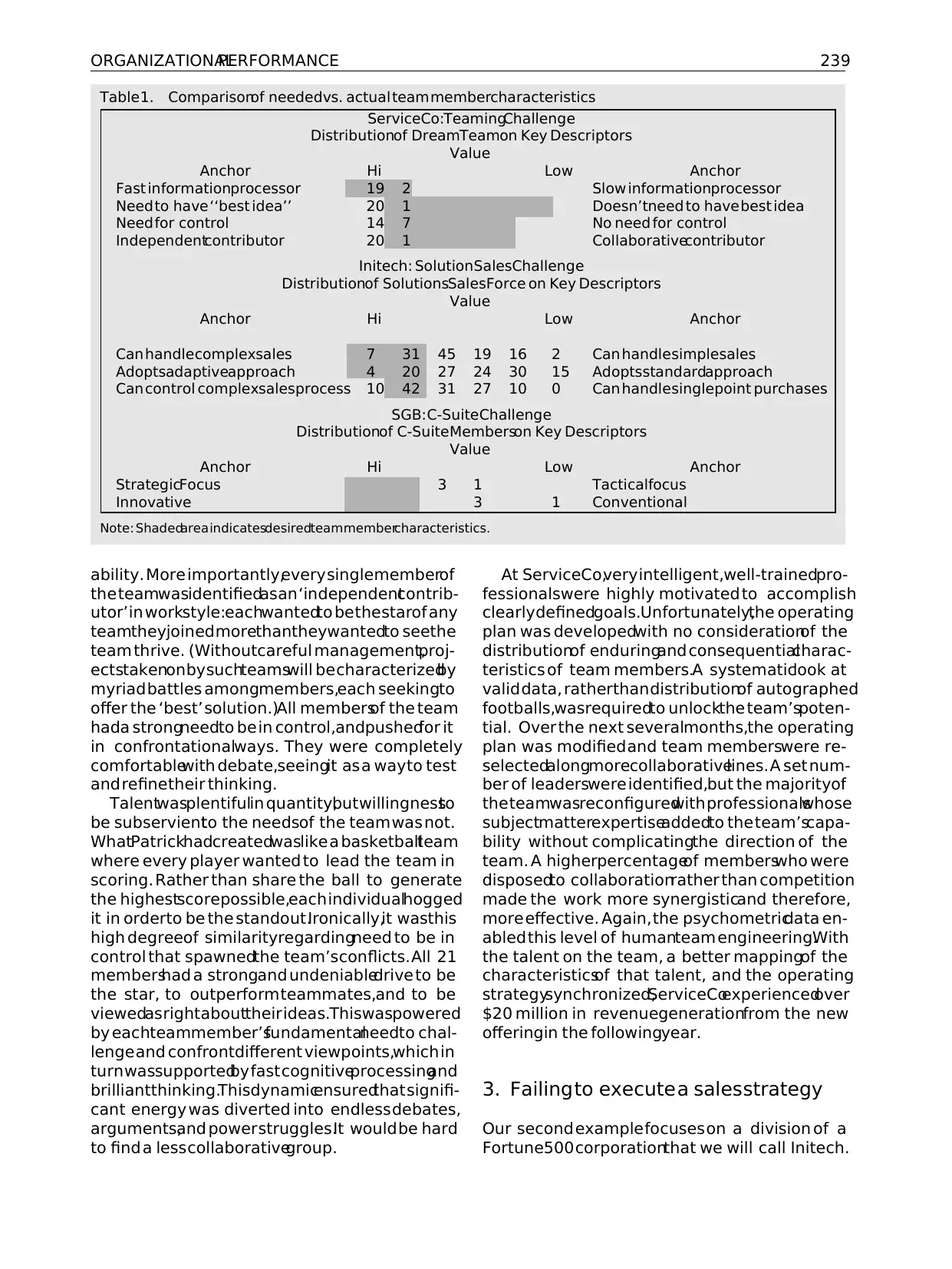
ability. More importantly,every singlememberof
the teamwasidentifiedasan ‘independentcontrib-
utor’ in workstyle:eachwantedto be thestarof any
teamtheyjoined morethantheywantedto seethe
team thrive. (Withoutcareful management,proj-
ectstakenon bysuchteamswill be characterizedby
myriad battles amongmembers,each seekingto
offer the ‘best’ solution.)All membersof the team
hada strongneedto be in control,andpushedfor it
in confrontationalways. They were completely
comfortablewith debate,seeingit as a wayto test
and refinetheir thinking.
Talentwasplentifulin quantity,butwillingnessto
be subservientto the needsof the team was not.
WhatPatrickhadcreatedwaslike a basketballteam
where every player wanted to lead the team in
scoring. Rather than share the ball to generate
the highestscorepossible,each individualhogged
it in orderto be the standout.Ironically,it wasthis
high degreeof similarityregardingneed to be in
control that spawnedthe team’sconflicts. All 21
membershad a strongand undeniabledrive to be
the star, to outperform teammates,and to be
viewedas rightabouttheir ideas.Thiswaspowered
by eachteammember’sfundamentalneedto chal-
lenge and confrontdifferent viewpoints,which in
turn wassupportedby fast cognitiveprocessingand
brilliantthinking.Thisdynamicensuredthat signifi-
cant energy was diverted into endless debates,
arguments,and power struggles.It would be hard
to find a less collaborativegroup.
At ServiceCo,very intelligent,well-trainedpro-
fessionalswere highly motivated to accomplish
clearly definedgoals.Unfortunately,the operating
plan was developedwith no considerationof the
distributionof enduringand consequentialcharac-
teristics of team members.A systematiclook at
valid data, ratherthan distributionof autographed
footballs,wasrequiredto unlockthe team’spoten-
tial. Over the next severalmonths,the operating
plan was modified and team memberswere re-
selectedalongmorecollaborativelines. A set num-
ber of leaderswere identified,but the majorityof
the teamwasreconfiguredwith professionalswhose
subjectmatterexpertiseaddedto the team’scapa-
bility without complicatingthe direction of the
team. A higherpercentageof memberswho were
disposedto collaborationrather than competition
made the work more synergisticand therefore,
more effective. Again, the psychometricdata en-
abled this level of humanteam engineering.With
the talent on the team, a better mappingof the
characteristicsof that talent, and the operating
strategysynchronized,ServiceCoexperiencedover
$20 million in revenuegenerationfrom the new
offeringin the followingyear.
3. Failing to execute a sales strategy
Our second example focuses on a division of a
Fortune500 corporationthat we will call Initech.
Table 1. Comparisonof neededvs. actual team membercharacteristics
ServiceCo:TeamingChallenge
Distributionof DreamTeamon Key Descriptors
Value
Anchor Hi Low Anchor
Fast informationprocessor 19 2 Slow informationprocessor
Need to have ‘‘best idea’’ 20 1 Doesn’tneed to have best idea
Need for control 14 7 No need for control
Independentcontributor 20 1 Collaborativecontributor
Initech: SolutionSalesChallenge
Distributionof SolutionsSalesForce on Key Descriptors
Value
Anchor Hi Low Anchor
Can handlecomplexsales 7 31 45 19 16 2 Can handlesimplesales
Adoptsadaptiveapproach 4 20 27 24 30 15 Adoptsstandardapproach
Can control complexsalesprocess 10 42 31 27 10 0 Can handlesinglepoint purchases
SGB: C-SuiteChallenge
Distributionof C-SuiteMemberson Key Descriptors
Value
Anchor Hi Low Anchor
StrategicFocus 3 1 Tacticalfocus
Innovative 3 1 Conventional
Note: Shadedarea indicatesdesiredteam membercharacteristics.
ORGANIZATIONALPERFORMANCE 239
the teamwasidentifiedasan ‘independentcontrib-
utor’ in workstyle:eachwantedto be thestarof any
teamtheyjoined morethantheywantedto seethe
team thrive. (Withoutcareful management,proj-
ectstakenon bysuchteamswill be characterizedby
myriad battles amongmembers,each seekingto
offer the ‘best’ solution.)All membersof the team
hada strongneedto be in control,andpushedfor it
in confrontationalways. They were completely
comfortablewith debate,seeingit as a wayto test
and refinetheir thinking.
Talentwasplentifulin quantity,butwillingnessto
be subservientto the needsof the team was not.
WhatPatrickhadcreatedwaslike a basketballteam
where every player wanted to lead the team in
scoring. Rather than share the ball to generate
the highestscorepossible,each individualhogged
it in orderto be the standout.Ironically,it wasthis
high degreeof similarityregardingneed to be in
control that spawnedthe team’sconflicts. All 21
membershad a strongand undeniabledrive to be
the star, to outperform teammates,and to be
viewedas rightabouttheir ideas.Thiswaspowered
by eachteammember’sfundamentalneedto chal-
lenge and confrontdifferent viewpoints,which in
turn wassupportedby fast cognitiveprocessingand
brilliantthinking.Thisdynamicensuredthat signifi-
cant energy was diverted into endless debates,
arguments,and power struggles.It would be hard
to find a less collaborativegroup.
At ServiceCo,very intelligent,well-trainedpro-
fessionalswere highly motivated to accomplish
clearly definedgoals.Unfortunately,the operating
plan was developedwith no considerationof the
distributionof enduringand consequentialcharac-
teristics of team members.A systematiclook at
valid data, ratherthan distributionof autographed
footballs,wasrequiredto unlockthe team’spoten-
tial. Over the next severalmonths,the operating
plan was modified and team memberswere re-
selectedalongmorecollaborativelines. A set num-
ber of leaderswere identified,but the majorityof
the teamwasreconfiguredwith professionalswhose
subjectmatterexpertiseaddedto the team’scapa-
bility without complicatingthe direction of the
team. A higherpercentageof memberswho were
disposedto collaborationrather than competition
made the work more synergisticand therefore,
more effective. Again, the psychometricdata en-
abled this level of humanteam engineering.With
the talent on the team, a better mappingof the
characteristicsof that talent, and the operating
strategysynchronized,ServiceCoexperiencedover
$20 million in revenuegenerationfrom the new
offeringin the followingyear.
3. Failing to execute a sales strategy
Our second example focuses on a division of a
Fortune500 corporationthat we will call Initech.
Table 1. Comparisonof neededvs. actual team membercharacteristics
ServiceCo:TeamingChallenge
Distributionof DreamTeamon Key Descriptors
Value
Anchor Hi Low Anchor
Fast informationprocessor 19 2 Slow informationprocessor
Need to have ‘‘best idea’’ 20 1 Doesn’tneed to have best idea
Need for control 14 7 No need for control
Independentcontributor 20 1 Collaborativecontributor
Initech: SolutionSalesChallenge
Distributionof SolutionsSalesForce on Key Descriptors
Value
Anchor Hi Low Anchor
Can handlecomplexsales 7 31 45 19 16 2 Can handlesimplesales
Adoptsadaptiveapproach 4 20 27 24 30 15 Adoptsstandardapproach
Can control complexsalesprocess 10 42 31 27 10 0 Can handlesinglepoint purchases
SGB: C-SuiteChallenge
Distributionof C-SuiteMemberson Key Descriptors
Value
Anchor Hi Low Anchor
StrategicFocus 3 1 Tacticalfocus
Innovative 3 1 Conventional
Note: Shadedarea indicatesdesiredteam membercharacteristics.
ORGANIZATIONALPERFORMANCE 239
⊘ This is a preview!⊘
Do you want full access?
Subscribe today to unlock all pages.

Trusted by 1+ million students worldwide
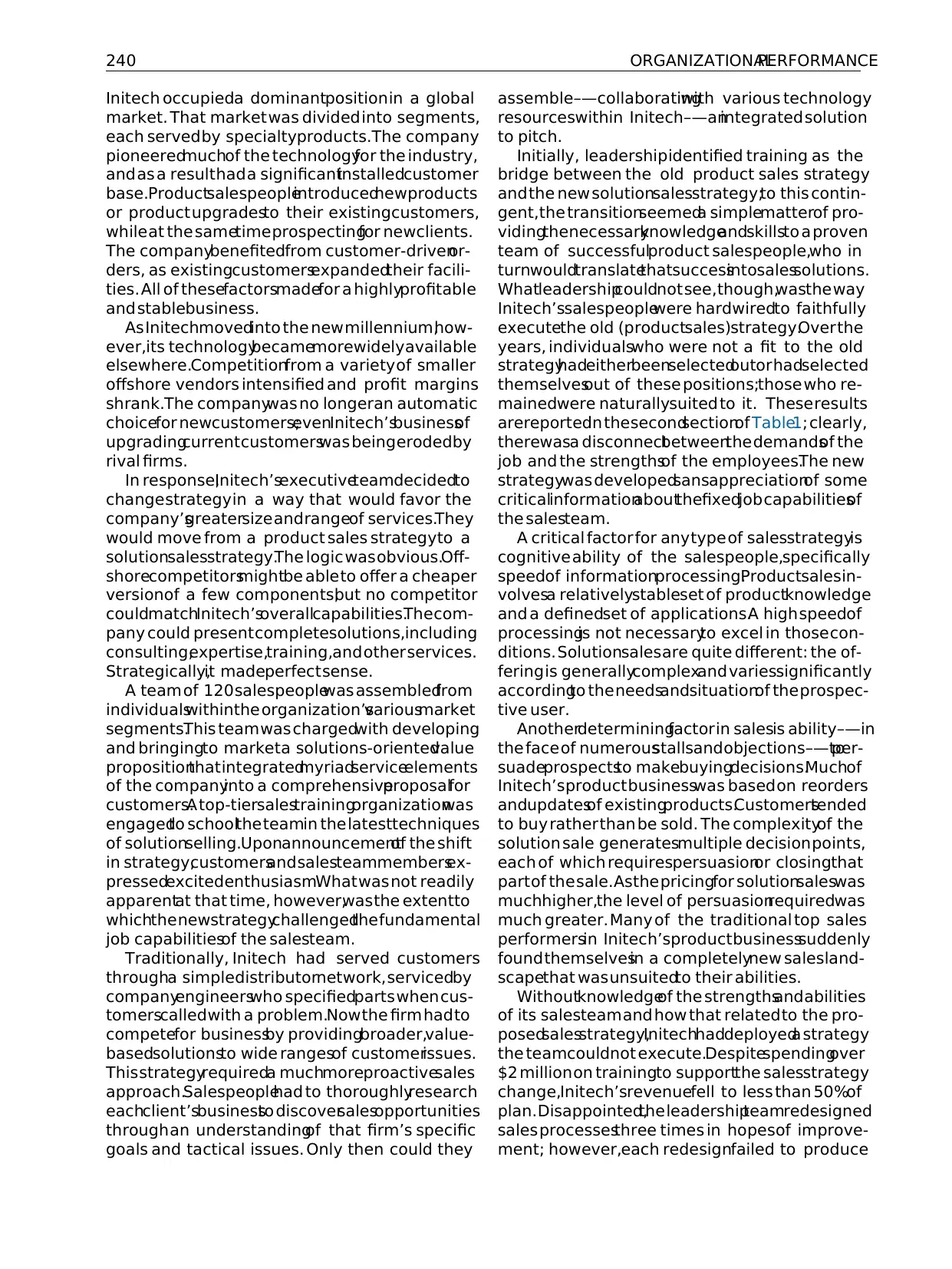
Initech occupieda dominantposition in a global
market. That market was divided into segments,
each served by specialtyproducts.The company
pioneeredmuchof the technologyfor the industry,
and as a result had a significantinstalledcustomer
base.Productsalespeopleintroducednewproducts
or product upgradesto their existingcustomers,
while at the sametime prospectingfor newclients.
The companybenefitedfrom customer-drivenor-
ders, as existingcustomersexpandedtheir facili-
ties. All of thesefactorsmadefor a highlyprofitable
and stablebusiness.
As Initechmovedinto the new millennium,how-
ever,its technologybecamemorewidely available
elsewhere.Competitionfrom a variety of smaller
offshore vendors intensified and profit margins
shrank.The companywas no longeran automatic
choicefor newcustomers;evenInitech’sbusinessof
upgradingcurrent customerswas beingerodedby
rival firms.
In response,Initech’sexecutiveteamdecidedto
change strategy in a way that would favor the
company’sgreatersize and rangeof services.They
would move from a product sales strategyto a
solutionsalesstrategy.The logic was obvious.Off-
shorecompetitorsmightbe able to offer a cheaper
versionof a few components,but no competitor
couldmatchInitech’soverallcapabilities.The com-
pany could present completesolutions,including
consulting,expertise,training,and other services.
Strategically,it madeperfect sense.
A team of 120 salespeoplewas assembledfrom
individualswithinthe organization’svariousmarket
segments.This team was chargedwith developing
and bringingto marketa solutions-orientedvalue
propositionthat integratedmyriadserviceelements
of the companyinto a comprehensiveproposalfor
customers.A top-tiersalestrainingorganizationwas
engagedto schoolthe teamin the latesttechniques
of solutionselling.Uponannouncementof the shift
in strategy,customersand salesteammembersex-
pressedexcitedenthusiasm.What was not readily
apparentat that time, however,was the extentto
whichthe newstrategychallengedthe fundamental
job capabilitiesof the salesteam.
Traditionally, Initech had served customers
througha simpledistributornetwork, servicedby
companyengineerswho specifiedparts when cus-
tomerscalled with a problem.Now the firm had to
competefor businessby providingbroader,value-
basedsolutionsto wide rangesof customerissues.
This strategyrequireda muchmoreproactivesales
approach.Salespeoplehad to thoroughlyresearch
eachclient’sbusinessto discoversalesopportunities
through an understandingof that firm’s specific
goals and tactical issues. Only then could they
assemble–—collaboratingwith various technology
resourceswithin Initech–—anintegrated solution
to pitch.
Initially, leadership identified training as the
bridge between the old product sales strategy
and the new solutionsalesstrategy;to this contin-
gent,the transitionseemeda simplematterof pro-
vidingthenecessaryknowledgeandskillsto a proven
team of successfulproduct salespeople,who in
turnwouldtranslatethatsuccessintosalessolutions.
Whatleadershipcouldnot see,though,wasthe way
Initech’ssalespeoplewere hardwiredto faithfully
executethe old (productsales)strategy.Over the
years, individualswho were not a fit to the old
strategyhadeitherbeenselectedoutor hadselected
themselvesout of these positions;those who re-
mainedwere naturallysuited to it. These results
arereportedin thesecondsectionof Table1; clearly,
therewasa disconnectbetweenthe demandsof the
job and the strengthsof the employees.The new
strategywas developedsansappreciationof some
criticalinformationaboutthefixedjob capabilitiesof
the salesteam.
A critical factor for any type of salesstrategyis
cognitive ability of the salespeople,specifically
speedof informationprocessing.Productsalesin-
volvesa relativelystableset of productknowledge
and a definedset of applications.A high speedof
processingis not necessaryto excel in those con-
ditions. Solutionsales are quite different: the of-
fering is generallycomplexand variessignificantly
accordingto the needsandsituationof the prospec-
tive user.
Anotherdeterminingfactor in salesis ability–—in
the face of numerousstallsandobjections–—toper-
suadeprospectsto makebuyingdecisions.Muchof
Initech’sproduct businesswas based on reorders
andupdatesof existingproducts.Customerstended
to buy rather than be sold. The complexityof the
solution sale generatesmultiple decision points,
each of which requirespersuasionor closingthat
part of the sale.Asthe pricingfor solutionsaleswas
muchhigher,the level of persuasionrequiredwas
much greater. Many of the traditional top sales
performersin Initech’sproduct businesssuddenly
found themselvesin a completelynew salesland-
scapethat was unsuitedto their abilities.
Withoutknowledgeof the strengthsandabilities
of its salesteam and how that related to the pro-
posedsalesstrategy,Initechhaddeployeda strategy
the teamcouldnot execute.Despitespendingover
$2 million on trainingto supportthe salesstrategy
change,Initech’srevenuefell to less than 50%of
plan. Disappointed,the leadershipteamredesigned
sales processesthree times in hopesof improve-
ment; however,each redesignfailed to produce
240 ORGANIZATIONALPERFORMANCE
market. That market was divided into segments,
each served by specialtyproducts.The company
pioneeredmuchof the technologyfor the industry,
and as a result had a significantinstalledcustomer
base.Productsalespeopleintroducednewproducts
or product upgradesto their existingcustomers,
while at the sametime prospectingfor newclients.
The companybenefitedfrom customer-drivenor-
ders, as existingcustomersexpandedtheir facili-
ties. All of thesefactorsmadefor a highlyprofitable
and stablebusiness.
As Initechmovedinto the new millennium,how-
ever,its technologybecamemorewidely available
elsewhere.Competitionfrom a variety of smaller
offshore vendors intensified and profit margins
shrank.The companywas no longeran automatic
choicefor newcustomers;evenInitech’sbusinessof
upgradingcurrent customerswas beingerodedby
rival firms.
In response,Initech’sexecutiveteamdecidedto
change strategy in a way that would favor the
company’sgreatersize and rangeof services.They
would move from a product sales strategyto a
solutionsalesstrategy.The logic was obvious.Off-
shorecompetitorsmightbe able to offer a cheaper
versionof a few components,but no competitor
couldmatchInitech’soverallcapabilities.The com-
pany could present completesolutions,including
consulting,expertise,training,and other services.
Strategically,it madeperfect sense.
A team of 120 salespeoplewas assembledfrom
individualswithinthe organization’svariousmarket
segments.This team was chargedwith developing
and bringingto marketa solutions-orientedvalue
propositionthat integratedmyriadserviceelements
of the companyinto a comprehensiveproposalfor
customers.A top-tiersalestrainingorganizationwas
engagedto schoolthe teamin the latesttechniques
of solutionselling.Uponannouncementof the shift
in strategy,customersand salesteammembersex-
pressedexcitedenthusiasm.What was not readily
apparentat that time, however,was the extentto
whichthe newstrategychallengedthe fundamental
job capabilitiesof the salesteam.
Traditionally, Initech had served customers
througha simpledistributornetwork, servicedby
companyengineerswho specifiedparts when cus-
tomerscalled with a problem.Now the firm had to
competefor businessby providingbroader,value-
basedsolutionsto wide rangesof customerissues.
This strategyrequireda muchmoreproactivesales
approach.Salespeoplehad to thoroughlyresearch
eachclient’sbusinessto discoversalesopportunities
through an understandingof that firm’s specific
goals and tactical issues. Only then could they
assemble–—collaboratingwith various technology
resourceswithin Initech–—anintegrated solution
to pitch.
Initially, leadership identified training as the
bridge between the old product sales strategy
and the new solutionsalesstrategy;to this contin-
gent,the transitionseemeda simplematterof pro-
vidingthenecessaryknowledgeandskillsto a proven
team of successfulproduct salespeople,who in
turnwouldtranslatethatsuccessintosalessolutions.
Whatleadershipcouldnot see,though,wasthe way
Initech’ssalespeoplewere hardwiredto faithfully
executethe old (productsales)strategy.Over the
years, individualswho were not a fit to the old
strategyhadeitherbeenselectedoutor hadselected
themselvesout of these positions;those who re-
mainedwere naturallysuited to it. These results
arereportedin thesecondsectionof Table1; clearly,
therewasa disconnectbetweenthe demandsof the
job and the strengthsof the employees.The new
strategywas developedsansappreciationof some
criticalinformationaboutthefixedjob capabilitiesof
the salesteam.
A critical factor for any type of salesstrategyis
cognitive ability of the salespeople,specifically
speedof informationprocessing.Productsalesin-
volvesa relativelystableset of productknowledge
and a definedset of applications.A high speedof
processingis not necessaryto excel in those con-
ditions. Solutionsales are quite different: the of-
fering is generallycomplexand variessignificantly
accordingto the needsandsituationof the prospec-
tive user.
Anotherdeterminingfactor in salesis ability–—in
the face of numerousstallsandobjections–—toper-
suadeprospectsto makebuyingdecisions.Muchof
Initech’sproduct businesswas based on reorders
andupdatesof existingproducts.Customerstended
to buy rather than be sold. The complexityof the
solution sale generatesmultiple decision points,
each of which requirespersuasionor closingthat
part of the sale.Asthe pricingfor solutionsaleswas
muchhigher,the level of persuasionrequiredwas
much greater. Many of the traditional top sales
performersin Initech’sproduct businesssuddenly
found themselvesin a completelynew salesland-
scapethat was unsuitedto their abilities.
Withoutknowledgeof the strengthsandabilities
of its salesteam and how that related to the pro-
posedsalesstrategy,Initechhaddeployeda strategy
the teamcouldnot execute.Despitespendingover
$2 million on trainingto supportthe salesstrategy
change,Initech’srevenuefell to less than 50%of
plan. Disappointed,the leadershipteamredesigned
sales processesthree times in hopesof improve-
ment; however,each redesignfailed to produce
240 ORGANIZATIONALPERFORMANCE
Paraphrase This Document
Need a fresh take? Get an instant paraphrase of this document with our AI Paraphraser
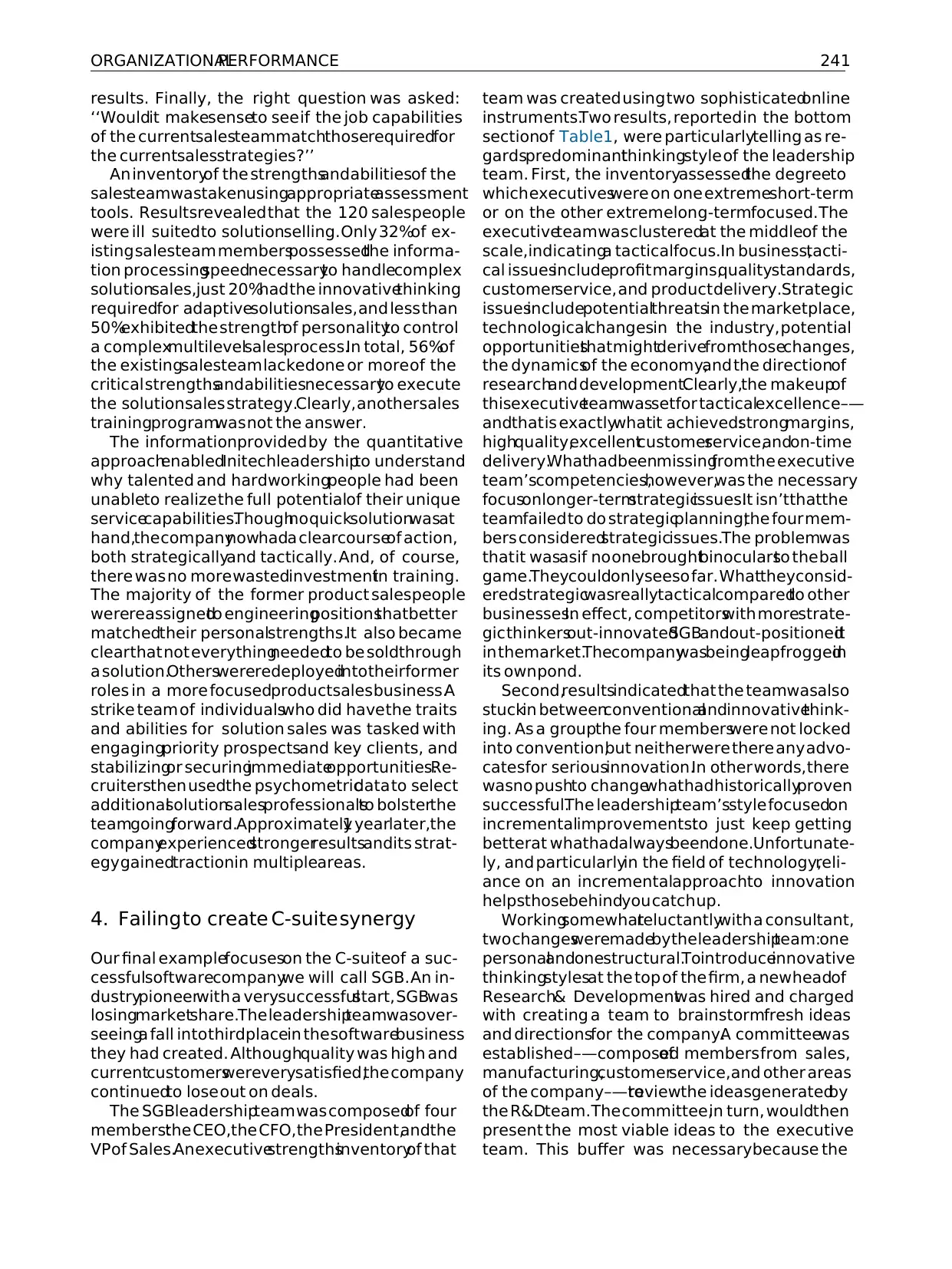
results. Finally, the right question was asked:
‘‘Wouldit makesenseto see if the job capabilities
of the currentsalesteammatchthoserequiredfor
the currentsalesstrategies?’’
An inventoryof the strengthsandabilitiesof the
salesteamwastakenusingappropriateassessment
tools. Resultsrevealed that the 120 salespeople
were ill suitedto solutionselling. Only 32%of ex-
isting salesteam memberspossessedthe informa-
tion processingspeednecessaryto handlecomplex
solutionsales,just 20%had the innovativethinking
requiredfor adaptivesolutionsales, and less than
50%exhibitedthe strengthof personalityto control
a complexmultilevelsalesprocess.In total, 56%of
the existingsalesteam lackedone or more of the
critical strengthsandabilitiesnecessaryto execute
the solutionsales strategy.Clearly, anothersales
trainingprogramwas not the answer.
The informationprovided by the quantitative
approachenabledInitechleadershipto understand
why talented and hardworkingpeople had been
unableto realize the full potentialof their unique
servicecapabilities.Thoughno quicksolutionwasat
hand,the companynowhada clearcourseof action,
both strategicallyand tactically. And, of course,
there was no more wastedinvestmentin training.
The majority of the former product salespeople
werereassignedto engineeringpositionsthatbetter
matchedtheir personalstrengths.It also became
clearthat not everythingneededto be soldthrough
a solution.Otherswereredeployedintotheirformer
roles in a more focusedproductsales business.A
strike team of individualswho did have the traits
and abilities for solution sales was tasked with
engagingpriority prospectsand key clients, and
stabilizingor securingimmediateopportunities.Re-
cruitersthen usedthe psychometricdata to select
additionalsolutionsalesprofessionalsto bolsterthe
teamgoingforward.Approximately1 yearlater,the
companyexperiencedstrongerresultsandits strat-
egy gainedtractionin multipleareas.
4. Failing to create C-suite synergy
Our final examplefocuseson the C-suiteof a suc-
cessfulsoftwarecompanywe will call SGB. An in-
dustrypioneerwith a verysuccessfulstart, SGBwas
losingmarketshare.The leadershipteamwasover-
seeinga fall into thirdplacein the softwarebusiness
they had created. Althoughquality was high and
currentcustomerswereverysatisfied,the company
continuedto lose out on deals.
The SGBleadershipteam was composedof four
members:the CEO,the CFO,the President,andthe
VPof Sales.An executivestrengthsinventoryof that
team was created using two sophisticatedonline
instruments.Two results, reported in the bottom
sectionof Table1, were particularlytelling as re-
gardspredominantthinkingstyle of the leadership
team. First, the inventoryassessedthe degreeto
which executiveswere on one extremeshort-term
or on the other extremelong-termfocused. The
executiveteamwasclusteredat the middleof the
scale,indicatinga tacticalfocus.In business,tacti-
cal issuesincludeprofit margins,qualitystandards,
customerservice, and product delivery.Strategic
issuesincludepotentialthreatsin the marketplace,
technologicalchangesin the industry, potential
opportunitiesthatmightderivefromthosechanges,
the dynamicsof the economy,and the directionof
researchand development.Clearly,the makeupof
thisexecutiveteamwassetfor tacticalexcellence–—
andthat is exactlywhatit achieved:strongmargins,
highquality,excellentcustomerservice,andon-time
delivery.Whathadbeenmissingfrom the executive
team’scompetencies,however,was the necessary
focusonlonger-termstrategicissues.It isn’tthatthe
teamfailed to do strategicplanning;the four mem-
bers consideredstrategicissues.The problemwas
that it wasasif no onebroughtbinocularsto the ball
game.Theycouldonlyseeso far. Whattheyconsid-
eredstrategicwasreallytacticalcomparedto other
businesses.In effect, competitorswith morestrate-
gic thinkersout-innovatedSGBandout-positionedit
in themarket.Thecompanywasbeingleapfroggedin
its own pond.
Second,resultsindicatedthat the teamwasalso
stuckin betweenconventionalandinnovativethink-
ing. As a groupthe four memberswere not locked
into convention,but neitherwere there any advo-
catesfor seriousinnovation.In other words, there
wasno pushto changewhathadhistoricallyproven
successful.The leadershipteam’sstyle focusedon
incrementalimprovements:to just keep getting
betterat whathadalwaysbeendone.Unfortunate-
ly, and particularlyin the field of technology,reli-
ance on an incrementalapproachto innovation
helpsthosebehindyou catch up.
Workingsomewhatreluctantlywith a consultant,
two changesweremadebytheleadershipteam:one
personalandonestructural.Tointroduceinnovative
thinkingstylesat the top of the firm, a new headof
Research& Developmentwas hired and charged
with creating a team to brainstormfresh ideas
and directionsfor the company.A committeewas
established–—composedof members from sales,
manufacturing,customerservice,and other areas
of the company–—toreviewthe ideasgeneratedby
the R&Dteam.The committee,in turn, wouldthen
present the most viable ideas to the executive
team. This buffer was necessarybecause the
ORGANIZATIONALPERFORMANCE 241
‘‘Wouldit makesenseto see if the job capabilities
of the currentsalesteammatchthoserequiredfor
the currentsalesstrategies?’’
An inventoryof the strengthsandabilitiesof the
salesteamwastakenusingappropriateassessment
tools. Resultsrevealed that the 120 salespeople
were ill suitedto solutionselling. Only 32%of ex-
isting salesteam memberspossessedthe informa-
tion processingspeednecessaryto handlecomplex
solutionsales,just 20%had the innovativethinking
requiredfor adaptivesolutionsales, and less than
50%exhibitedthe strengthof personalityto control
a complexmultilevelsalesprocess.In total, 56%of
the existingsalesteam lackedone or more of the
critical strengthsandabilitiesnecessaryto execute
the solutionsales strategy.Clearly, anothersales
trainingprogramwas not the answer.
The informationprovided by the quantitative
approachenabledInitechleadershipto understand
why talented and hardworkingpeople had been
unableto realize the full potentialof their unique
servicecapabilities.Thoughno quicksolutionwasat
hand,the companynowhada clearcourseof action,
both strategicallyand tactically. And, of course,
there was no more wastedinvestmentin training.
The majority of the former product salespeople
werereassignedto engineeringpositionsthatbetter
matchedtheir personalstrengths.It also became
clearthat not everythingneededto be soldthrough
a solution.Otherswereredeployedintotheirformer
roles in a more focusedproductsales business.A
strike team of individualswho did have the traits
and abilities for solution sales was tasked with
engagingpriority prospectsand key clients, and
stabilizingor securingimmediateopportunities.Re-
cruitersthen usedthe psychometricdata to select
additionalsolutionsalesprofessionalsto bolsterthe
teamgoingforward.Approximately1 yearlater,the
companyexperiencedstrongerresultsandits strat-
egy gainedtractionin multipleareas.
4. Failing to create C-suite synergy
Our final examplefocuseson the C-suiteof a suc-
cessfulsoftwarecompanywe will call SGB. An in-
dustrypioneerwith a verysuccessfulstart, SGBwas
losingmarketshare.The leadershipteamwasover-
seeinga fall into thirdplacein the softwarebusiness
they had created. Althoughquality was high and
currentcustomerswereverysatisfied,the company
continuedto lose out on deals.
The SGBleadershipteam was composedof four
members:the CEO,the CFO,the President,andthe
VPof Sales.An executivestrengthsinventoryof that
team was created using two sophisticatedonline
instruments.Two results, reported in the bottom
sectionof Table1, were particularlytelling as re-
gardspredominantthinkingstyle of the leadership
team. First, the inventoryassessedthe degreeto
which executiveswere on one extremeshort-term
or on the other extremelong-termfocused. The
executiveteamwasclusteredat the middleof the
scale,indicatinga tacticalfocus.In business,tacti-
cal issuesincludeprofit margins,qualitystandards,
customerservice, and product delivery.Strategic
issuesincludepotentialthreatsin the marketplace,
technologicalchangesin the industry, potential
opportunitiesthatmightderivefromthosechanges,
the dynamicsof the economy,and the directionof
researchand development.Clearly,the makeupof
thisexecutiveteamwassetfor tacticalexcellence–—
andthat is exactlywhatit achieved:strongmargins,
highquality,excellentcustomerservice,andon-time
delivery.Whathadbeenmissingfrom the executive
team’scompetencies,however,was the necessary
focusonlonger-termstrategicissues.It isn’tthatthe
teamfailed to do strategicplanning;the four mem-
bers consideredstrategicissues.The problemwas
that it wasasif no onebroughtbinocularsto the ball
game.Theycouldonlyseeso far. Whattheyconsid-
eredstrategicwasreallytacticalcomparedto other
businesses.In effect, competitorswith morestrate-
gic thinkersout-innovatedSGBandout-positionedit
in themarket.Thecompanywasbeingleapfroggedin
its own pond.
Second,resultsindicatedthat the teamwasalso
stuckin betweenconventionalandinnovativethink-
ing. As a groupthe four memberswere not locked
into convention,but neitherwere there any advo-
catesfor seriousinnovation.In other words, there
wasno pushto changewhathadhistoricallyproven
successful.The leadershipteam’sstyle focusedon
incrementalimprovements:to just keep getting
betterat whathadalwaysbeendone.Unfortunate-
ly, and particularlyin the field of technology,reli-
ance on an incrementalapproachto innovation
helpsthosebehindyou catch up.
Workingsomewhatreluctantlywith a consultant,
two changesweremadebytheleadershipteam:one
personalandonestructural.Tointroduceinnovative
thinkingstylesat the top of the firm, a new headof
Research& Developmentwas hired and charged
with creating a team to brainstormfresh ideas
and directionsfor the company.A committeewas
established–—composedof members from sales,
manufacturing,customerservice,and other areas
of the company–—toreviewthe ideasgeneratedby
the R&Dteam.The committee,in turn, wouldthen
present the most viable ideas to the executive
team. This buffer was necessarybecause the
ORGANIZATIONALPERFORMANCE 241
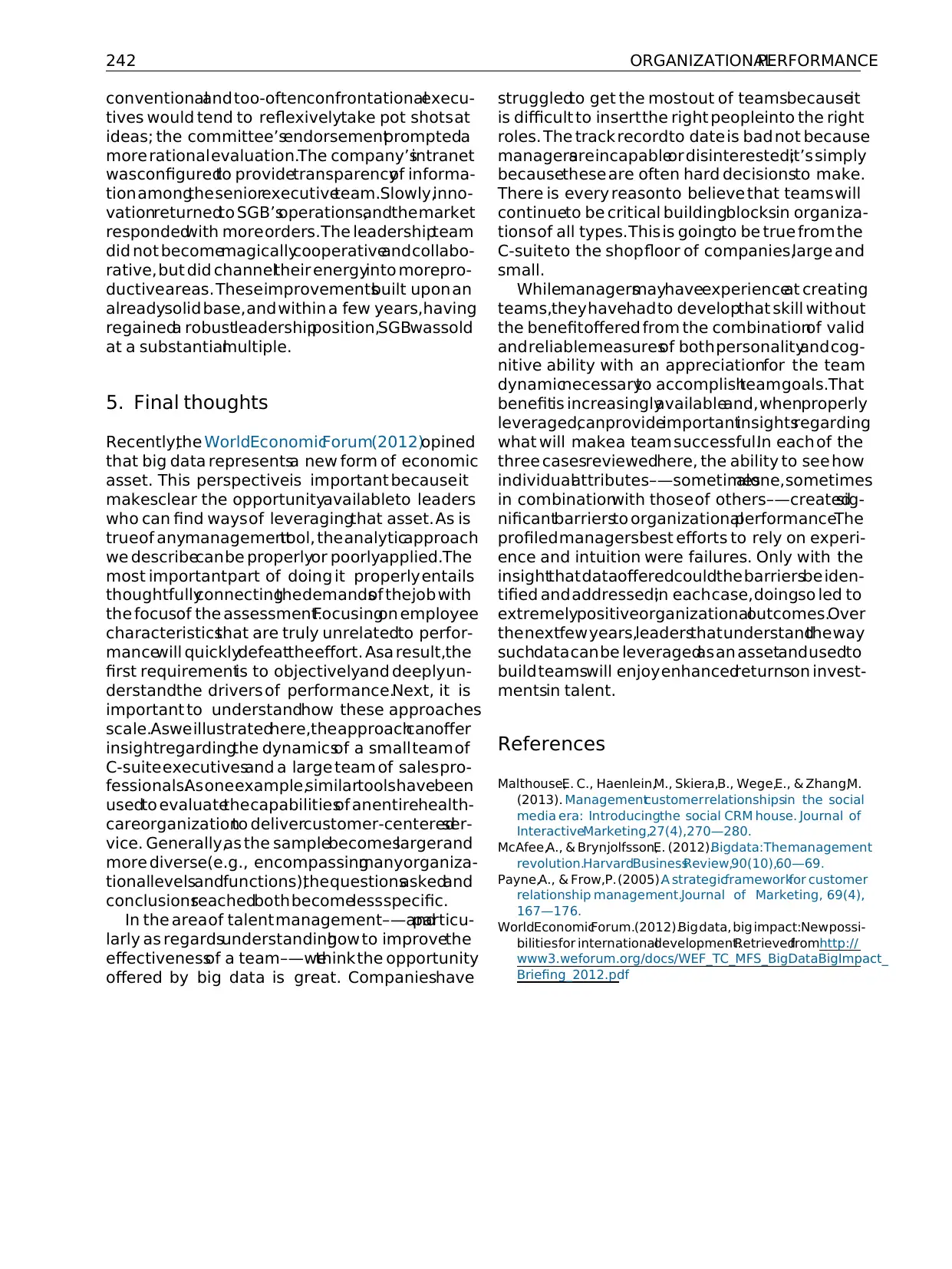
conventionaland too-oftenconfrontationalexecu-
tives would tend to reflexivelytake pot shots at
ideas; the committee’sendorsementprompteda
more rational evaluation.The company’sintranet
wasconfiguredto providetransparencyof informa-
tion amongthe seniorexecutiveteam.Slowly,inno-
vationreturnedto SGB’soperations,andthe market
respondedwith more orders.The leadershipteam
did not becomemagicallycooperativeand collabo-
rative, but did channeltheir energyinto morepro-
ductiveareas. These improvementsbuilt upon an
alreadysolid base, and within a few years,having
regaineda robustleadershipposition,SGBwassold
at a substantialmultiple.
5. Final thoughts
Recently,the WorldEconomicForum(2012)opined
that big data representsa new form of economic
asset. This perspectiveis important because it
makesclear the opportunityavailableto leaders
who can find ways of leveragingthat asset. As is
trueof anymanagementtool, the analyticapproach
we describecan be properlyor poorlyapplied.The
most importantpart of doing it properly entails
thoughtfullyconnectingthedemandsof thejob with
the focusof the assessment.Focusingon employee
characteristicsthat are truly unrelatedto perfor-
mancewill quicklydefeatthe effort. Asa result,the
first requirementis to objectivelyand deeplyun-
derstandthe drivers of performance.Next, it is
important to understandhow these approaches
scale.Aswe illustratedhere,the approachcanoffer
insightregardingthe dynamicsof a small team of
C-suite executivesand a large team of sales pro-
fessionals.As one example,similartoolshavebeen
usedto evaluatethe capabilitiesof anentirehealth-
careorganizationto delivercustomer-centeredser-
vice. Generally,as the samplebecomeslargerand
more diverse(e.g., encompassingmanyorganiza-
tionallevelsandfunctions),the questionsaskedand
conclusionsreachedboth becomeless specific.
In the area of talent management–—andparticu-
larly as regardsunderstandinghow to improvethe
effectivenessof a team–—wethink the opportunity
offered by big data is great. Companieshave
struggledto get the most out of teamsbecauseit
is difficult to insert the right peopleinto the right
roles. The track recordto date is bad not because
managersare incapableor disinterested;it’s simply
becausethese are often hard decisionsto make.
There is every reasonto believe that teams will
continueto be critical buildingblocksin organiza-
tions of all types. This is goingto be true from the
C-suite to the shop floor of companies,large and
small.
Whilemanagersmayhaveexperienceat creating
teams,they havehad to developthat skill without
the benefit offered from the combinationof valid
and reliable measuresof both personalityand cog-
nitive ability with an appreciationfor the team
dynamicnecessaryto accomplishteam goals.That
benefitis increasinglyavailableand, whenproperly
leveraged,canprovideimportantinsightsregarding
what will makea team successful.In each of the
three casesreviewedhere, the ability to see how
individualattributes–—sometimesalone,sometimes
in combinationwith those of others–—createdsig-
nificantbarriersto organizationalperformance.The
profiled managers’best efforts to rely on experi-
ence and intuition were failures. Only with the
insightthat dataofferedcouldthe barriersbe iden-
tified and addressed;in each case, doingso led to
extremelypositiveorganizationaloutcomes.Over
the nextfew years,leadersthat understandthe way
suchdata can be leveragedas an assetand usedto
build teamswill enjoy enhancedreturnson invest-
mentsin talent.
References
Malthouse,E. C., Haenlein,M., Skiera,B., Wege,E., & Zhang,M.
(2013). Managementcustomer relationshipsin the social
media era: Introducingthe social CRM house. Journal of
InteractiveMarketing,27(4),270—280.
McAfee,A., & Brynjolfsson,E. (2012).Bigdata:The management
revolution.HarvardBusinessReview,90(10),60—69.
Payne,A., & Frow,P. (2005).A strategicframeworkfor customer
relationship management.Journal of Marketing, 69(4),
167—176.
WorldEconomicForum.(2012).Big data, big impact:New possi-
bilitiesfor internationaldevelopment.Retrievedfromhttp://
www3.weforum.org/docs/WEF_TC_MFS_BigDataBigImpact_
Briefing_2012.pdf
242 ORGANIZATIONALPERFORMANCE
tives would tend to reflexivelytake pot shots at
ideas; the committee’sendorsementprompteda
more rational evaluation.The company’sintranet
wasconfiguredto providetransparencyof informa-
tion amongthe seniorexecutiveteam.Slowly,inno-
vationreturnedto SGB’soperations,andthe market
respondedwith more orders.The leadershipteam
did not becomemagicallycooperativeand collabo-
rative, but did channeltheir energyinto morepro-
ductiveareas. These improvementsbuilt upon an
alreadysolid base, and within a few years,having
regaineda robustleadershipposition,SGBwassold
at a substantialmultiple.
5. Final thoughts
Recently,the WorldEconomicForum(2012)opined
that big data representsa new form of economic
asset. This perspectiveis important because it
makesclear the opportunityavailableto leaders
who can find ways of leveragingthat asset. As is
trueof anymanagementtool, the analyticapproach
we describecan be properlyor poorlyapplied.The
most importantpart of doing it properly entails
thoughtfullyconnectingthedemandsof thejob with
the focusof the assessment.Focusingon employee
characteristicsthat are truly unrelatedto perfor-
mancewill quicklydefeatthe effort. Asa result,the
first requirementis to objectivelyand deeplyun-
derstandthe drivers of performance.Next, it is
important to understandhow these approaches
scale.Aswe illustratedhere,the approachcanoffer
insightregardingthe dynamicsof a small team of
C-suite executivesand a large team of sales pro-
fessionals.As one example,similartoolshavebeen
usedto evaluatethe capabilitiesof anentirehealth-
careorganizationto delivercustomer-centeredser-
vice. Generally,as the samplebecomeslargerand
more diverse(e.g., encompassingmanyorganiza-
tionallevelsandfunctions),the questionsaskedand
conclusionsreachedboth becomeless specific.
In the area of talent management–—andparticu-
larly as regardsunderstandinghow to improvethe
effectivenessof a team–—wethink the opportunity
offered by big data is great. Companieshave
struggledto get the most out of teamsbecauseit
is difficult to insert the right peopleinto the right
roles. The track recordto date is bad not because
managersare incapableor disinterested;it’s simply
becausethese are often hard decisionsto make.
There is every reasonto believe that teams will
continueto be critical buildingblocksin organiza-
tions of all types. This is goingto be true from the
C-suite to the shop floor of companies,large and
small.
Whilemanagersmayhaveexperienceat creating
teams,they havehad to developthat skill without
the benefit offered from the combinationof valid
and reliable measuresof both personalityand cog-
nitive ability with an appreciationfor the team
dynamicnecessaryto accomplishteam goals.That
benefitis increasinglyavailableand, whenproperly
leveraged,canprovideimportantinsightsregarding
what will makea team successful.In each of the
three casesreviewedhere, the ability to see how
individualattributes–—sometimesalone,sometimes
in combinationwith those of others–—createdsig-
nificantbarriersto organizationalperformance.The
profiled managers’best efforts to rely on experi-
ence and intuition were failures. Only with the
insightthat dataofferedcouldthe barriersbe iden-
tified and addressed;in each case, doingso led to
extremelypositiveorganizationaloutcomes.Over
the nextfew years,leadersthat understandthe way
suchdata can be leveragedas an assetand usedto
build teamswill enjoy enhancedreturnson invest-
mentsin talent.
References
Malthouse,E. C., Haenlein,M., Skiera,B., Wege,E., & Zhang,M.
(2013). Managementcustomer relationshipsin the social
media era: Introducingthe social CRM house. Journal of
InteractiveMarketing,27(4),270—280.
McAfee,A., & Brynjolfsson,E. (2012).Bigdata:The management
revolution.HarvardBusinessReview,90(10),60—69.
Payne,A., & Frow,P. (2005).A strategicframeworkfor customer
relationship management.Journal of Marketing, 69(4),
167—176.
WorldEconomicForum.(2012).Big data, big impact:New possi-
bilitiesfor internationaldevelopment.Retrievedfromhttp://
www3.weforum.org/docs/WEF_TC_MFS_BigDataBigImpact_
Briefing_2012.pdf
242 ORGANIZATIONALPERFORMANCE
⊘ This is a preview!⊘
Do you want full access?
Subscribe today to unlock all pages.

Trusted by 1+ million students worldwide
1 out of 6
Your All-in-One AI-Powered Toolkit for Academic Success.
+13062052269
info@desklib.com
Available 24*7 on WhatsApp / Email
![[object Object]](/_next/static/media/star-bottom.7253800d.svg)
Unlock your academic potential
Copyright © 2020–2026 A2Z Services. All Rights Reserved. Developed and managed by ZUCOL.